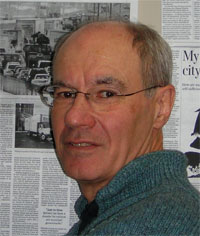 |
| Clive Doucet will be at Dalhousie to deliver the lecture, Streetcars, Streetcar Values and Surviving Climate Change in Cities. |
The polar bear is on Clive Doucet's mind. Specifically, the melting of the polar ice cap has him thinking about how crises in the natural world reflect crises in the world's cities.
"The bear has become a kind of shorthand to me for what's going wrong," says the author and urban activist. "Ultimately, we're all polar bears."
Mr. Doucet does a lot of thinking about things like sustainability, climate change, and how to create resilient communities. In addition to writing about these issues, he is a city councillor in Ottawa, where he strives to get people including politicians to think differently about their approaches to problems like urban congestion and renewal. His latest book is titled Urban Meltdown: Cities, Climate Change and Politics as Usual.
"The polar bear needs the ice to hunt from. When the ice disappears, it starves. Likewise, our principle habitation for the last 100 years has been in cities. Over 80 per cent of the Canadian population live in cities. They're our ice floes, and they're in trouble."
|
"If you look at the heart of what's happening across North America, we've developed into two kinds of cities: refuge cities and refugee cities," he says. He describes Halifax, Vancouver and Seattle as examples of refuge cities.
"These cities are clean, with relatively low crime rates, a generous supply of water, and sewer and transportation systems that work," he says. "The real issue for these cities is going to be how to accommodate all the people who want to live in them."
Refugee cities, on the other hand, are dealing with a mass exodus of people. Cities like New Orleans and Detroit can no longer support their populations, he says, adding that Detroit loses about 1,000 people a month.
"If we don't find a way to stop the process, the refuge cities will be overwhelmed. Like the polar bear, we'll lose our ice pan."
He says there are many possible solutions to the challenges faced by today's urban areas, which are directly tied to issues such like climate change. None of them are easy, he says, and all of them involve you and I.
"As human beings, all of our instinctive defenses don't work with climate change issues," he says. "On one hand, the solutions are simple, on the other hand, they are difficult. People have to live their lives differently. You can't get on that plane as much, you have to put away your car sometimes, you have to live simply. You have to advocate for political change. These are the kinds of changes that can be emotionally and intellectually difficult."
"What's happening in the natural world should be a wake up call for all of us," he says. "God has not given human beings a special dispensation from extinction."
